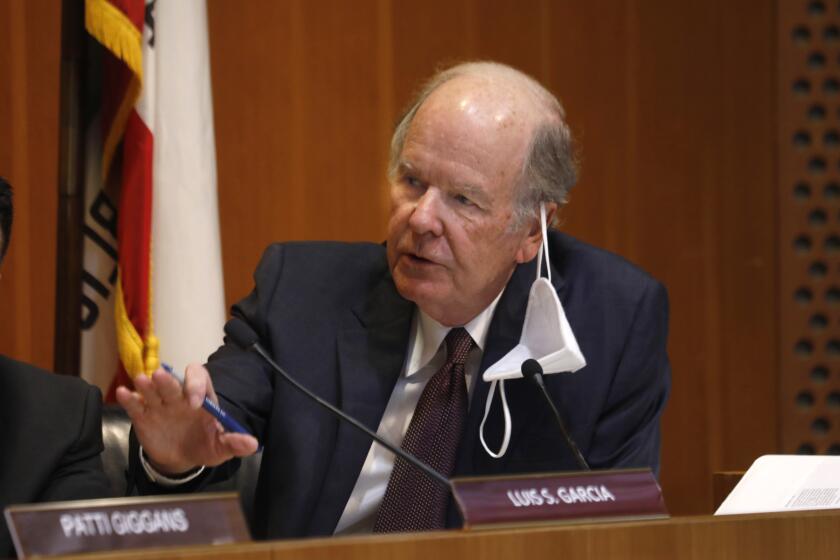ELECTIONS : Voters Backing Recall; Camarillo Bond Trails
- Share via
Three incumbent directors of the Camrosa Water District were being recalled in early returns Tuesday after a campaign in which their critics accused them of raising water rates without adequate study.
At the same time, Camarillo voters appeared to be defeating Measure H, a $55-million school bond measure that would have allowed the Pleasant Valley Elementary School District to build a new school in eastern Camarillo and renovate the district’s 14 aging campuses.
The apparent loss followed the defeat by voters five months earlier of a $75-million bond proposal.
In early returns, Camrosa board President Jack C. Rogers and members William Goth and Kenneth P. Gerry were headed toward being recalled.
If the recall proves successful, Tad Mattock, who ran unsuccessfully against Rogers two years ago, would be elected. Jeffrey C. Brown, an investment banker, would replace Goth, and John B. Lamb would take Gerry’s place on the board. Both Lamb and Gerry are farmers.
Voters also elected two newcomers to the Camrosa board in contests in which the incumbents chose not to run for reelection.
Selected to fill the seat vacated by Carolynn Nicholson was Timothy H. Hoag, a 36-year-old pharmacist who supported the recall and ran unopposed.
Leading in early returns for the seat left vacant when Doug McDonald moved from the district was businessman Ronald J. Vogel, who was opposed by Deborah C. Reynolds, an employee of the Calleguas Water District.
If the recall is successful and with the election of new directors for the district’s two open seats, Camrosa customers appeared ready to complete a clean sweep of the district’s five-member board.
The Camrosa district serves 8,400 residences and 200 farms in Camarillo and the Santa Rosa Valley.
Anger over the rate increase in May by the Camrosa Water District is widely considered to have fueled the recall campaign against the three board incumbents.
Faced with a request by the Metropolitan Water District last spring to decrease residential water use by 30%, Camrosa directors approved a 38% increase in base rates and created a four-tier rate structure to discourage waste.
Some customers were outraged when they received the first new bills, with some residential customers required to pay up to $700 for a month. Many maintained that the new rates were punitive and would result in windfall profits for the district.
The rate increase hit especially hard in the Santa Rosa Valley, where homeowners typically used far greater amounts of water than the average customer to keep large lawns healthy, Gerry said.
“We had never been in a situation where we had to care about how much water we used,” he said.
A recall campaign started by the Citizens for Reliable Water Management group proved successful, with the dissident customers gathering signatures from more than 20% of the district’s 12,015 registered voters.
“A tier system is not the way to go,” said Hoag, the recall supporter who ran unopposed for an open seat.
The board eliminated the costliest price tier in July, and in October it approved a new rate structure that put the district in line with other area water providers.
Administrators with the Pleasant Valley Elementary School District said they decided to lower their sights in Tuesday’s election after voters rejected a $75-million bond proposal in June.
Jettisoned were plans for a new intermediate school and additional improvements.
The school district also used $35,000 contributed by Pardee Construction, a large home builder in eastern Camarillo, to conduct two phone surveys that helped them fine-tune the campaign for Measure H.
According to the survey, the district had overlooked opposition from residents in west Camarillo who believed that the bond measure primarily benefited eastern Camarillo residents, said Howard Hamilton, an assistant superintendent.
Other races in the county offered fewer surprises.
Customers of the Meiners Oaks Water District also went to the polls Tuesday, but the campaign was decidedly less heated than Camrosa’s.
Two incumbents sought reelection to the five-member board that serves a district with 1,200 customers. Joseph Adinolf and Robert G. Branch faced a challenge from first-time candidate Don Wright.
Residents in two widely separated unincorporated areas voted for candidates for municipal advisory councils, but there was little campaigning or disagreement in the races.
In the Ventura River Valley Municipal Advisory Council, 15-year incumbent Gerhard Orthuber ran unopposed, and promised that the four-year term would be his last.
Incumbent Joan Kemper, first appointed 3 1/2 years ago, was locked in a low-key contest with Lanie Jo Springer. “If there is a race, it will be to see who is better known,” Kemper said.
In contests for the Oak Park Municipal Advisory Council, two candidates squared off in each of two races. All four candidates expressed support for cityhood and for a compromise settlement of the Jordan Ranch development issue.
Incumbent John Kruer is facing a challenge from Ramona L. Spradling in a race that Kruer said reflected more common ground than disagreement.
In the other race, two newcomers are competing to fill an open seat. George Anterasian has backed paramedic services in the area, while Joyce Shimkus has emphasized her extensive ties to the community.
And voters in two eastern county precincts cast ballots for Proposition K, a parcel tax that would raise $3 million annually and allow the Las Virgenes Unified School District to reduce class sizes.
To pass, the proposition required two-thirds approval of the district’s voters. The measure would impose a $150 annual fee for four years for each of the district’s 22,000 parcels, with exemptions granted to senior citizens.
All of the district’s schools are in Los Angeles County, but some of its students come from Ventura County, which has two voting precincts.
More to Read
Sign up for Essential California
The most important California stories and recommendations in your inbox every morning.
You may occasionally receive promotional content from the Los Angeles Times.













